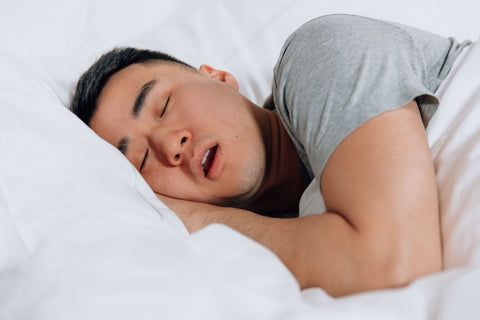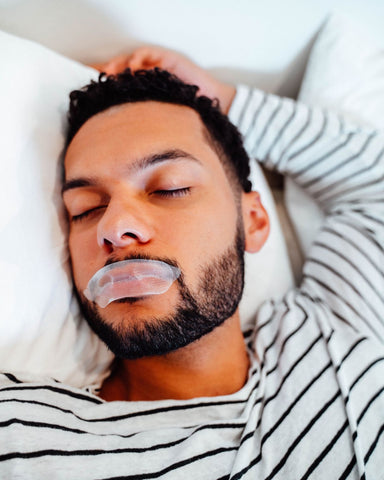
Free US Shipping on Orders $50+
Number of weeks:
$6.25 / week
Total: $24.99
1 month
$4.66 / week
Total: $71.97 $55.97
3 months
$4.23 / week
Total: $311.87 $219.97
12 months
28 Strips = 4 Weeks
Auto delivery every 3 months for $50.37.
No hidden fees. Сancel anytime.
We all need sleep to function. But when you break down the reality of sleep, it’s kind of unsettling to ponder.
We lay in the dark, unconscious, moving very little (if at all) for several hours at a time.
Sometimes, we remember different visuals, scenes, sights, and sounds from inside of our brains that we experience while we rest during dreams.
We have questions, and we’re sure you do, too. Why do we need sleep? What is the neuroscience behind rest? Do we really need adequate amounts of sleep to function properly?
Neurologist and sleep physician Dr. Guy Leschziner set out to answer these questions and more with his book “The Nocturnal Brain: Nightmares, Neuroscience, and The Secret World of Sleep.”
Dr. Guy Leschziner’s research offers some of the most important and comprehensive insights into the world of sleep and sleep disorders.
“The Nocturnal Brain” proves that sleep disorders can be not only neurological but psychological. Furthermore, Leschinzer’s findings prove just how dangerous sleep deprivation can be.
In “The Nocturnal Brain,” we learn about how sleep deprivation and sleep disorders affect people on a personal level.

For example, 20-year-old Alex orders pizza in his sleep (and has for several years). Don, age 60, compulsively eats while asleep.
Jackie, a 70-year-old woman, had to sell her motorbike when she discovered that she began driving it while asleep.
While these examples may seem comical, they’re actually no joke. Imagine how life-threatening it would be to discover you had been driving while unconscious!
Chronic insomnia affects one in ten adults. “The Nocturnal Brain” doesn’t promise to cure it, but it does pose some interesting questions and surprising answers about the importance of sleep.
For starters, your brain isn’t always fully asleep at night. However, some people have a more of an issue with this than others.
Your brain should go through certain steps during specific stages of sleep, and sometimes our brains get mixed up when cycling through each phase.
If you haven’t had enough sleep, the dangers can be life-threatening.
If you’re short on sleep, your brain may shut down for a brief moment during the day. These moments are known as “micro-sleeps.”
During a micro-sleep, you will literally fall unconscious for a few seconds without even realizing it. This affects the brain just as much as alcohol and is a leading cause of car accidents and fatal accidents within the workplace.

Chronic sleep deprivation over time has even been linked to brain disorders such as schizophrenia and Alzheimer’s.
In children, lack of sleep has been shown to cause disruptive behavior. In reality, getting just one hour less of sleep per night across several days has adverse effects on a child’s behavior in school.
Overall, evidence shows that good sleep patterns are vital for achieving overall health. But what does good sleep look like? And why is each phase of sleep so important?
There are two main types of sleep: rapid eye movement (REM) and non-REM. Non-REM has three separate stages.
You cycle through every stage of non-REM and REM sleep multiple times during a typical night of rest.
Non-REM Stage 1
During this short period, your body and mind begin to transition from awake to light sleep.
Your heart rate, breathing rate, and eye movements begin to slow down as your muscles relax. Brain waves start to slow.
Non-REM Stage 2
During this stage of sleep, you remain in a period of light sleep before reaching deeper sleep.
Your heart rate and breathing continue to slow as your body temperature decreases, muscles relax even further, and eye movements stop altogether. Brain waves continue to slow, but small, quick bursts of electrical activity occur.
Non-REM Stage 3
Stage 3 non-REM sleep occurs in longer periods throughout the first half of the night. Your heartbeat and breathing slow down to their slowest rates during this phase of sleep. Brain waves slow to their lowest level of activity.
Experts believe that stage 3 sleep is where our most restorative sleep takes place, helping us recover, grow, and process memories.
REM Sleep
REM sleep first occurs within around 90 minutes of falling asleep. During this stage, your eyes move back and forth rapidly, giving this stage of sleep its name.
Brain activity during this stage is closer to the same type of activity seen during waking hours, which may explain why most of our dreams take place during REM sleep.
Breathing and heart rates increase, while the arms and legs become paralyzed to prevent you from acting out any dreams.

This sleep stage is believed to be essential to cognitive functioning, including learning, creativity, and memory.
The amount of time spent in each sleep phase may vary between individuals, especially depending on age. During a solid night’s rest, your body should go through anywhere from four to five 90-minute cycles, from stage 1 through 3 and into REM sleep.
Cycles that occur closer to falling asleep may include longer stretches of deep sleep, while portions spent in REM sleep increase as morning nears.
Now that we know why sleep deprivation is dangerous and how “the nocturnal brain” functions during rest as it cycles through sleep phases, we can dive into why researchers theorize that we need sleep in the first place.
Believe it or not, sleep is like food for the brain.
By now, you’ve heard that most adults need to get between 7 to 9 hours of sleep per night to function properly. But why?
Sleep may actually provide “nutrition” to the brain. Sleeping too little causes the stress hormone cortisol to spike, signaling to your body to conserve more energy throughout the day.

Insulin helps us transform food into energy. When the body doesn’t respond correctly to insulin, we store fat rather than processing it for energy. Without adequate sleep, insulin sensitivity drops by more than 30 percent.
This may slow metabolism, causing our bodies to hang onto fat. Sleep deprivation causes metabolic hunger, while sufficient sleep helps to lower cortisol and process insulin more efficiently.
Sleep not only “feeds” our physical bodies, but it also feeds our minds in a way that connects to emotional health.
Have you ever felt extremely irritable after a poor night’s rest? There’s a reason for that.
During sleep, brain activity in areas responsible for regulating emotions increases.
The amygdala, striatum, insula, medial prefrontal cortex, and hippocampus all light up as we rest. As an example, let’s take a closer look at the amygdala.
This part of the brain is responsible for our fear response. When faced with a threat, the amygdala controls our reaction to stressful situations.
If you’re getting proper amounts of sleep, the amygdala functions in a regulated manner. However, if you’re sleep-deprived, the amygdala may overreact to stimuli, causing you to feel off-balance.
This may explain the connection between mental health and sleep. Sleep disturbances worsen and contribute to mental health conditions.
Proper sleep patterns prevent us from feeling irritable and just plain bad.
However, sleep doesn’t just help to restore and regulate parts of the brain like the amygdala. It helps to restore the entire body.
Sleep provides the body a chance to repair itself, boost the immune system, repair damaged tissues, grow muscles, and more.
Certain growth hormones are released during sleep only. Without adequate sleep, the body can’t function and maintain itself.

In fact, some animals lose the ability to maintain their immune systems and die within weeks after experiencing sleep deprivation.
Extreme sleep deprivation messes with our immune response, causing an increase in inflammation across the body.
As a result, our risk for developing or worsening infections or diseases skyrockets when we’re low on sleep.
When we’re awake, the body produces adenosine. Throughout the day, this builds up within the brain. Typically, this build-up makes us feel tired.
If you’re not sleeping, adenosine accumulates. High levels of adenosine cause chronic inflammation, fibrosis, and even organ damage.
It’s imperative that we sleep to clear adenosine from the brain, wash away inflammation, and heal.
Without these restorative stages of sleep, we can’t learn and process memories as we should, either.
It’s long been theorized that sleeping and dreaming help us clear out unnecessary memories and remember vital, important information.
@somnifix Why do we #dream 🤔💭 @ministryofscience explains! #science #didyouknow #learnontiktok #sleep #insomnia #nightmares ♬ First Class - Jack Harlow
In fact, lack of sleep is tied to memory processing issues in both humans and mice.
Another study proved that a lack of proper sleep reduces learning efficiency by messing with the brain’s synapses.
Synapses are tiny connections between our neurons that work with neurotransmitters to pass electrical signals from one neuron to another.
During the day, our synapses are fired on, ready to respond to any stimuli we experience in our environment.
As we sleep, these synapses power down, helping us feel restored and renewed when we wake and need to use them at a higher capacity. Without restorative sleep, our synapses function at full power for too long.
This hinders neuroplasticity of the brain, or our ability to create new connections between neurons. Neuroplasticity is vital for helping us learn new skills and new pieces of information.

We need efficient sleep to keep learning, functioning, and processing properly.
Strangely enough, sleep becomes fragmented by easily preventable things, such as snoring.
If you want to decrease sleep deprivation, addressing sleep-disordered breathing that causes snoring is a great place to start.
As we’ve learned, the quality of our sleep is directly tied to the quality of our lives.
Mouth breathing at night causes snoring, which leads to poor oxygen exchange, fragmented sleep, and in severe cases, sleep apnea and other health conditions.
Proper airway health and breathing techniques can drastically improve our well-being. Putting an end to mouth breathing during the day requires some extra attention on our breath, but what about at night?
Since we can’t actively pay attention to our breathing during sleep, the easiest way to ensure nasal breathing during rest is to tape your mouth shut before bed.
It’s a proven snoring solution that helps us get the adequate sleep we need to stay healthy and function properly.

Before you slap on any tape, wait! Harmful chemicals in the adhesives of most tapes are known to cause irritation and rashes.
SomniFix Mouth Strips are hypoallergenic and feature a gel-like adhesion that is so comfortable you’ll forget you’re even wearing mouth tape.
Your nocturnal brain needs nasal breathing – SomniFix ensures that you’ll nasal breathe all night long!
Achieve each restorative phase of sleep with SomniFix tonight.
If you don't LOVE your sleep in 7 nights, we'll give your money back guaranteed! 🌟